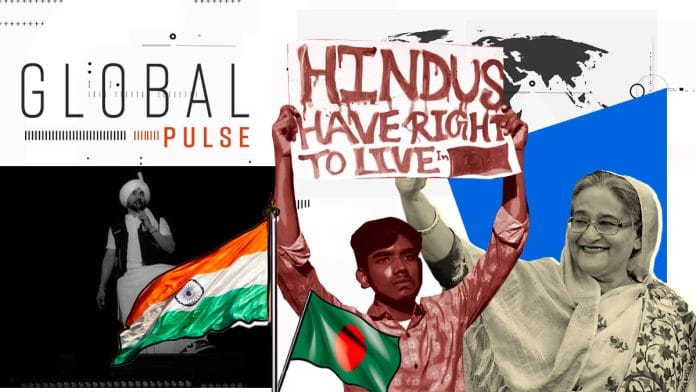New Delhi: Bangladesh’s Hindus are gripped with fear—and part of the reason is the torrent of misinformation coming from India, reports the New York Times.
While several Bangladeshi Hindus—who account for about 9 percent of the population—confirmed episodes of vandalism and mob violence, they “also said that the cases of forged or exaggerated information had muddied the real threat to them”.
While the country’s interim government says it is committed to protecting minorities, having conducted 70 arrests related to 88 attacks over the past three months, the threat is “being exaggerated” across the border in India to “score political points among right-wing Hindus as well as to pave a path for Ms Hasina’s restoration,” the New York Times reports.
“An early sign of the politicisation of Hindus’ plight came in the days after Ms Hasina’s fall in August, when an office of her party, the Awami League, was burned. A temple known as Navagraha Bari stood nearby. Videos spread across Indian social media falsely asserting that the temple had been attacked,” the story says.
The Bangladesh saga is still playing out in India. Dhaka asked New Delhi to return Sheikh Hasina to her country via note verbale, and while India confirmed its receipt, the Ministry of External Affairs refrained from commenting.
The Dhaka Tribune reports that the International Crimes Tribunal Chief Prosecutor Mohammad Tajul Islam told reporters that diplomatic actions are being taken at the “state level”, and that “diplomatic channels are actively being utilised”.
He went on to say that Dhaka expects New Delhi to fully cooperate. “The request seeks the return of the former prime minister to ensure justice. Bangladesh has formally notified India of its position and expects their cooperation,” the Dhaka Tribune quotes him as saying.
The Indian government’s timeline, however, seems uncertain, the report adds.
The Dhaka Tribune also recently carried an op-ed on the deteriorating India-Bangladesh ties, and which country stands to lose more. The answer, according to the author, is very clearly India.
“If India persists with its policy of exerting pressure on Bangladesh through false accusations, India may bare [sic] a greater risk,” the piece opens, before diving into the various advantages of having Bangladesh on India’s side—like having unfettered access to two of Bangladesh’s seaports, its highways, and a river port.
“Over her 16 years in power, Hasina gave India unrestricted access to transit, corridors, transshipment, and connectivity, but in return, Bangladesh only received promises, such as simplified visa policies,” the piece says. On the other hand, Bangladesh can easily replace Indian imports from “other countries around the world at the same price and with better quality”.
The author concedes that this might be logistically challenging, but if “the people of Bangladesh are willing to endure temporary inconveniences, it is possible to shift to alternative sources, just as Nepal did in 2015 when India imposed an unofficial trade blockade.”
“So, overall, India’s continuous pressure on Bangladesh will have minimal impact and Bangladesh is unlikely to be significantly frightened by India’s threats,” he concludes.
The BBC, meanwhile, reports on a uniquely Indian problem: “stinking toilets and traffic jams” at concerts with overpriced tickets.
ThePrint has written about this too, citing ticket mafias, overpriced water and bad network as some of the reasons why Indian concerts are a masterclass in mismanagement.
India’s been a tour stop for major concerts by artists like Dua Lipa, Bryan Adams, Diljit Dosanjh, and Maroon 5, while other international artists like Green Day, Coldplay, and Ed Sheeran are set to take Indian stages in the coming year. Music concerts in India generated about $94.1 million in the last year—a figure that is set to increase by 25 percent by the end of 2025.
“Young, well-to-do Indians are not just willing to pay more to see their favourite music stars, but are actively seeking out these events. In 2023, more than 400,000 people in India said they travelled to other Indian cities to attend live events,” the BBC reports. “But despite the enthusiasm, many concertgoers say their experience has been far from ideal.”
India doesn’t have enough venues dedicated to live concerts, reports the BBC—there are significant infrastructural challenges in India today. “Nowadays, a lot of music events are held inside public stadiums to minimise some of the inconveniences, but that comes with its own challenges, such as poor sound quality, crowd management issues and lots of red tape,” it reports.
Also read: Bollywood’s ongoing blockbuster bust & the bitter truth behind Maharashtra’s sugar industry






